Lucy Walsh Veterinary Physiotherapy
Fully insured, Masters qualified and NAVP accredited veterinary physiotherapist and certified Equinology Equine Bodyworker (EEBW) covering Hampshire, Surrey and surrounding areas.
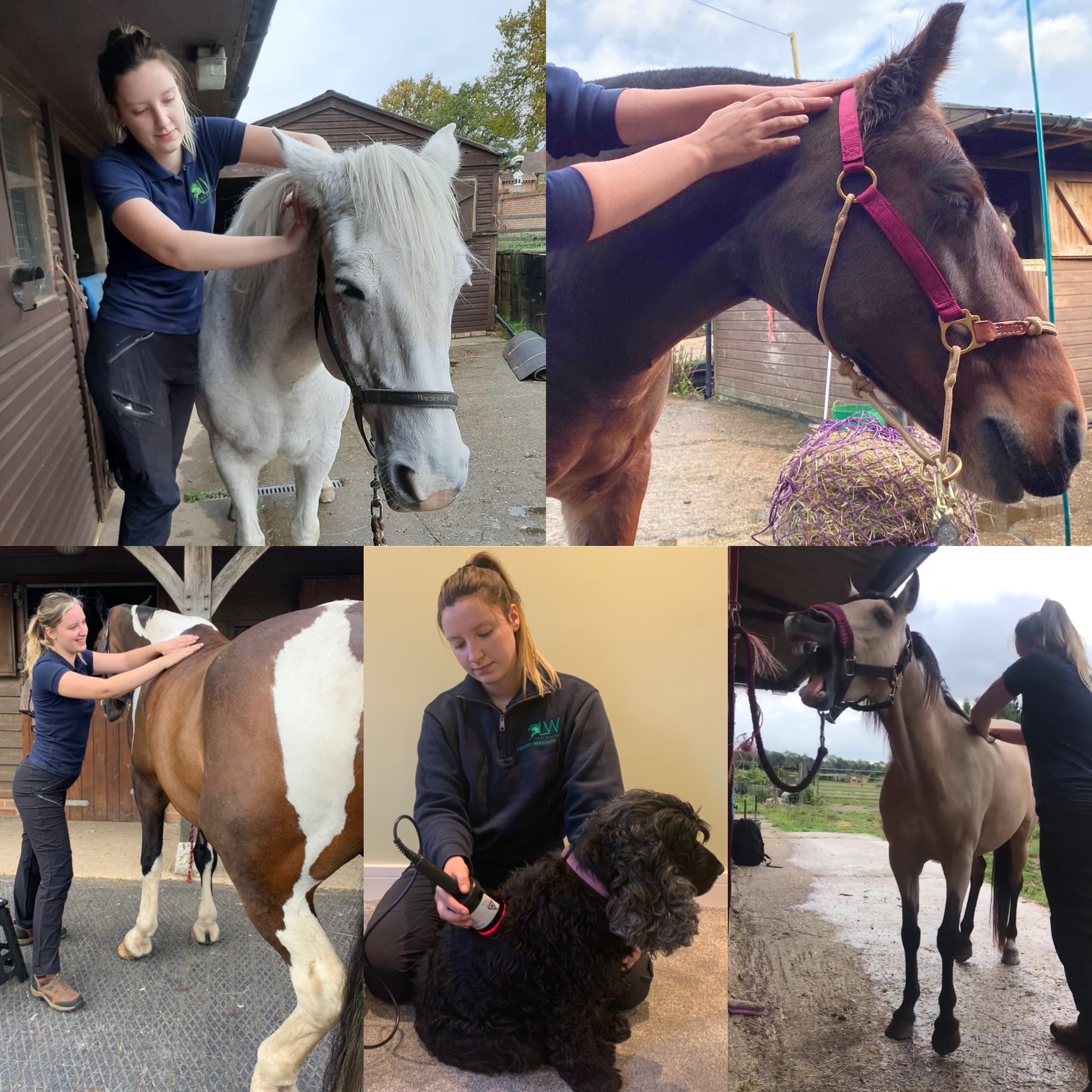
About me
I am a fully insured Masters qualified veterinary physiotherapist covering Hampshire, Surrey and surrounding counties. I am also a certified Equinology Equine Bodyworker (EEBW) and have undertaken additional CPD with Rocktape to expand my knowledge and practical use of kinesiotape in equines. I am also a proud member of the National Association of Veterinary Physiotherapists (NAVP).
My journey began at Sparsholt College in 2014 where I developed my love for horses and a particular interest in physiotherapy. This interest of mine blossomed following a veterinary physiotherapy demonstration organised by the college. In 2016, my vet physio career aspirations led me to study a 4 year integrated Masters degree at Writtle University College, providing me with the extensive knowledge, practical skills and competency demonstrated throughout the physiotherapy services I offer for both horses and dogs.
Alongside my studies, I also undertook a separate Equine Bodywork course with Equinology, which allowed me to develop my manual therapy and massage techniques, forming the basis of my physiotherapy services in equines.
I am also proud to be part of the team at The Vet Station in East Molesey as a small animal physiotherapist providing physio for dogs and cats 1 day per week.
Services
Physiotherapy Sessions
Physiotherapy sessions are tailored to the individual animal's requirements in accordance with clinical history and findings upon assessment. Treatment modalities may include:
- Massage
- Stretching
- Heat Therapy (Epiony Heat Pad)
- Pulsed Electromagnetic Field Therapy (PEMFT)
- Low Level Laser Therapy (LLLT)
- Phototherapy (Photizo Vetcare)
- Shortwave Ultrasound Therapy (3MHz and 1MHz)
- Transcutaneous Electrical Nerve Stimulation (TENS)
- Neuromuscular Electrical Stimulation (NMES)
- Kinesiology tape (Rocktape - equine only)
- Remedial exercise
After sessions, all clients are emailed a detailed report outlining findings, applied treatment and homework.
Physiotherapy can be beneficial to the vast majority of animals by helping to reduce pain, manage symptoms of arthritis and other clinical conditions, enhance performance, improve fitness and strength and aid in the recovery from injury or surgery. Physiotherapy can also help to address performance or stress related behaviours in horses, particularly during ridden work.
PLEASE CONTACT ME FOR A PRICE - TRAVEL FEES MAY APPLY DEPENDING ON LOCATION.
PLEASE NOTE: A 50% cancellation fee applies if less than 48 hours notice is given.
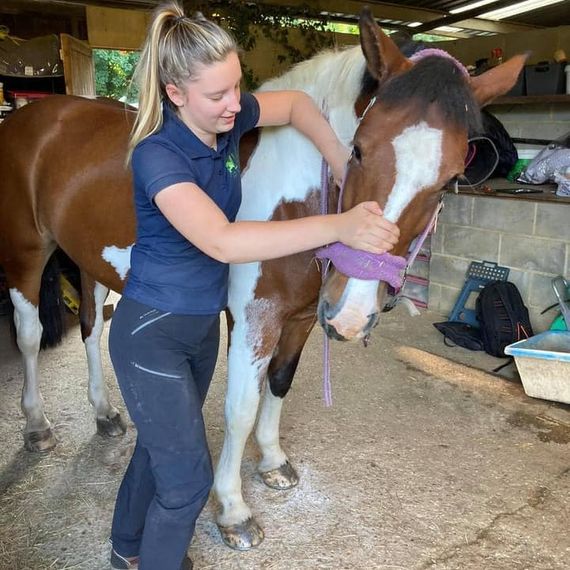
Assessment
All sessions begin with a thorough discussion of clinical history followed by a static, dynamic, palpation and range of motion joint assessment.
These elements form the foundations for the treatment plan to follow for the rest of the session. Assessments are always carried out upon every visit to monitor any changes.
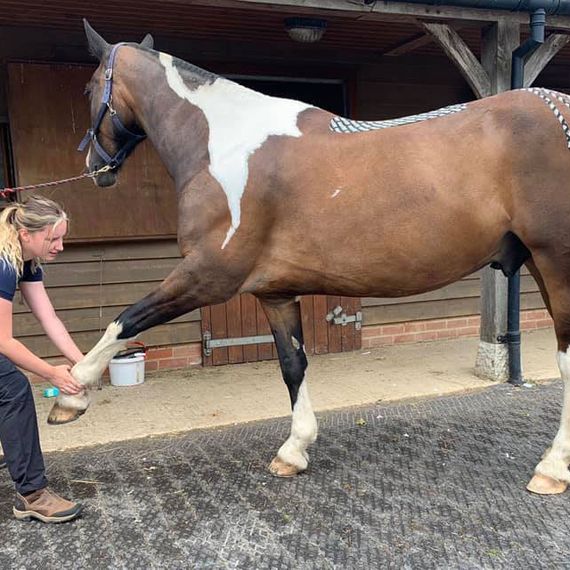
Manual Therapy
The majority of the session will consist of hands-on modalities including massage and stretching. Massage will always be the primary treatment choice, which will then be complimented by electrotherapies where required.
Massage can help to:
- Provide pain relief by relaxing muscles and decreasing tension
- Improve blood flow and lymphatic drainage therefore decrease toxins in muscle
- Promote relaxation by releasing endorphins
- Enable the animal to move more freely by releasing muscular restrictions and improving joint range of motion
- Improve muscle mass and strength
Stretching can help to:
- Increase extensibility of muscles and therefore flexibility
- Increase joint range of motion by elongating muscle fibres
- Reduce muscle tension
- Reduce risk of future muscular injury
- Reduce post-exercise muscle soreness
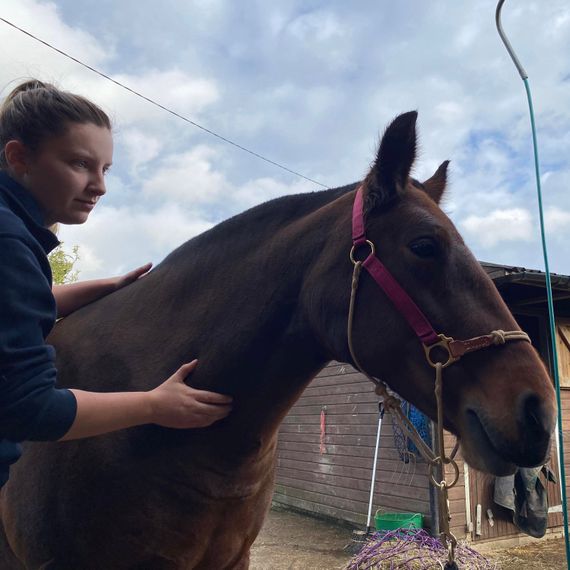
Electrotherapy
The electrotherapies used in the session are chosen in accordance with the findings upon assessment and are used to compliment manual therapy.
- Heat therapy has pain relieving effects and can help to reduce muscle tension. In sessions, the Epoiny Heat Pad can be used in both horses and dogs on painful or sensitive areas.
- Pulsed Electromagnetic Field Therapy (PEMFT) has a variety of uses dependant on what setting is used. It is most commonly used for both acute and chronic pain, and has a deep penetration so is helpful for deeper areas that heat may not reach (such as the sacroiliac joint in the horse). Other uses for PEMFT include reducing swelling or oedema, assisting in fracture healing and helping with neurological problems by stimulating nerves to fire more functionally.
- Low level LASER therapy (LLLT) and phototherapy share similar concepts, but the main difference is that LLLT exposes tissues to red and near infrared light and has a deeper penetration. Although phototherapy works in a similar way, the power output is much lesser therefore phototherapy is less invasive than LLLT. LLLT and phototherapy can be used for both pain relief and the stimulation of healing, dependant on the setting used.
- Shortwave Ultrasound therapy (SU) is very effective for improving healing rates in tendon and ligament injuries in both humans and animals. The correct shortwave ultrasound head is chosen in accordance with the depth of penetration needed. The 3MHz head is perfect for superficial digital flexor tendon (SDFT) issues, and the 1MHz is better for deep digital flexor tendon (DDFT) issues and other deeper structures.
- Transcutaneous Electrical Nerve Stimulation (TENS) can be useful for horses with chronic back pain, but is not often tolerated in canine patients. It is best used on a frequent basis, so is rented out to equine clients for use in their own time.
- Neuromuscular electrical stimulation (NMES) is perfect for significant muscle atrophy that can sometimes occur after disuse of a limb following surgery or injury. This modality is great for muscle building.
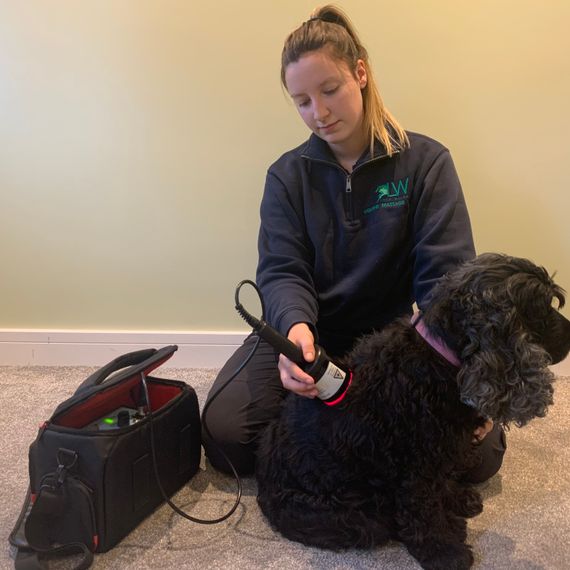
Remedial Exercise
All clients will be provided with demonstrations of specific exercises that are to be completed between sessions in order to help optimise the animal's treatment. Video tutorials will be provided to clients for homework exercises.
In addition to these, I can also provide detailed rehabilitation plans for animals recovering from injury or surgery or animals with an increased workload. These can also help equine clients to bring their horse's back into work gradually. This is at an additional cost (4-week rehabilitation plan £10).
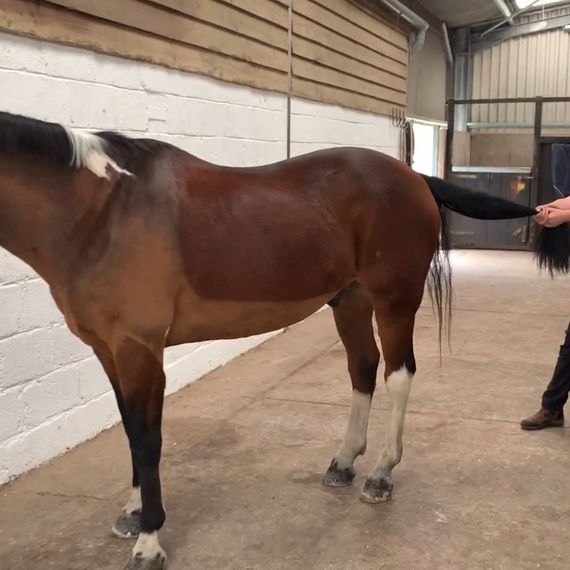
CASE STUDY - Kissing Spines
Menace, the 16 year old 11.2hh Dartmoor Pony, had been bucking with his young rider during canter transitions. In his maintenance physiotherapy sessions, I had picked up some back pain that was unusually not resolving with the treatments. I wanted to rule out an ill fitting saddle before looking any further into it. However, his back continued to be moderately to severely reactive upon palpation. Working with Cedar Equine Vets in Alton, we decided to X-ray the spine to check for Kissing Spines. Menace had several dorsal spinous processes (DSPs) impinging in the thoracic region of the spine which explained the bucking and pain upon palpation. Menace's owner opted to have Kissing Spines resection surgery at Liphook Equine Hospital. As a physiotherapist, my job was to assist in the rehabilitation from the surgery and eventually bring Menace back into ridden work. Initially, I was seeing Menace on a 2 weekly basis. In the first instance, the main aim was to reduce inflammation of the surgical site with cold therapy. Following this, I wanted to address any muscle pain surrounding the area concerned. This was addressed with massage, LASER and pulsed electromagnetic field therapy (PEMF). Strict instructions were given to Menace's owner about in hand walking, lunging and eventually riding durations. I am very pleased to say that after a fair few months of intensive physio, Menace is now back to full health and being ridden by his young rider with no bucking. He now sees me every 3 months for his routine physiotherapy sessions. Great result!
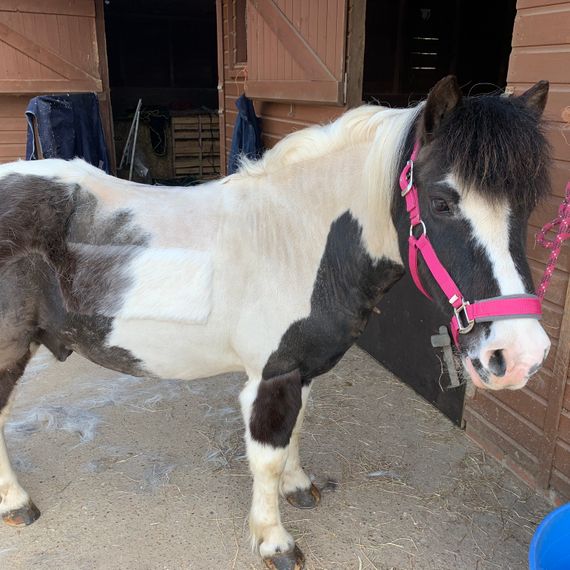
CASE STUDY - Cranial Cruciate Ligament Rupture (CCLR)
Blue is a very active 4 year old Cocker Spaniel. Blue's owner contacted me 1-2 weeks after his right stifle was operated on. Blue underwent a Tibial Plateau Levelling Osteotomy (TPLO) to slightly alter the angle of his stifle joint following the rupture of the cranial cruciate ligament (CCL). During a TPLO surgery, the knee is altered and fixed in place with metal screws and plates. I helped Blue and his owner by creating an intensive rehab plan for the coming weeks and months to give Blue the best chance of recovery. The rehabilitation included lots of slow lead walking, weight shifting, massage and heat therapy. The main aims for Blue were to increase weight bearing on the right hind, to provide pain relief to the stifle, to increase muscle tone and strength of right hind and to address any compensatory issues in the left hind or forelimbs. To help improve muscle tone and activity in the right hind musculature, neuromuscular electrical stimulation (NMES) was used daily. In addition to this, a combination of pulsed electromagnetic field therapy (PEMF) and LASER therapy was used to help with pain relief. Blue's owner was required to perform exercises with Blue involving the wobble cushion and poles in the later stages of rehabilitation. After a few months of physio for this injury, I was more than happy with his progress and just about to sign him off from physio. Then, he decided to escape from the garden, run across the countryside and rupture his left hind CCL! Following TPLO of the left hind, we are currently working through the rehabilitation process again. However, this time, Blue's owners are well aware of the process so I am sure we will have Blue back to full health very soon.

CASE STUDY - Arthritis
Toffee is a 15 year old Exotic cat. Her owner approached me beginning of 2021 as Toffee was diagnosed with arthritis of the lumbar vertebrae and was unhappy being stroked or handled in this area. After 3-4 physiotherapy sessions, Toffee was far less reactive in this area and her owner is very happy with the results. Her owner now only contacts me as and when she feels Toffee is starting to get a little sore again, but she only needs seeing every 2-3 months now. During the colder months, she might see me slightly more often, as arthritic joints can worsen in the colder weather. To help with the pain related with arthritis, I used pulsed electromagnetic field therapy (PEMF) on her lumbosacral region alongside LASER therapy along the spine and hip joints. Toffee also enjoys massage along her paraspinals which helps to decrease muscle tension, increase blood flow to the spinal region and stimulate the release of certain hormones, thus providing pain relief. One happy cat, happy owner and very happy physio!
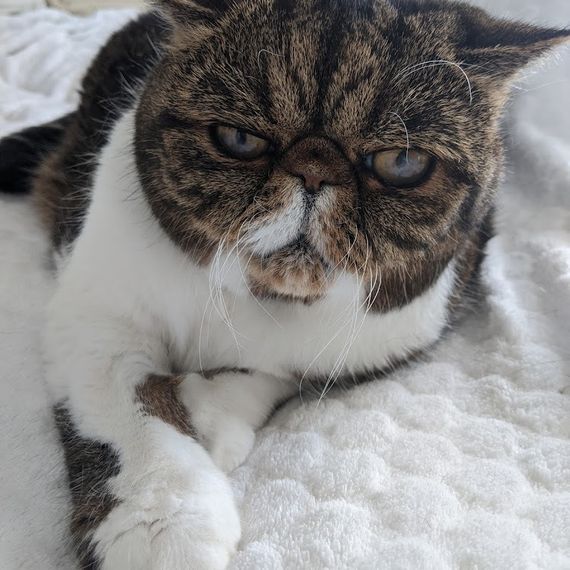
Gallery
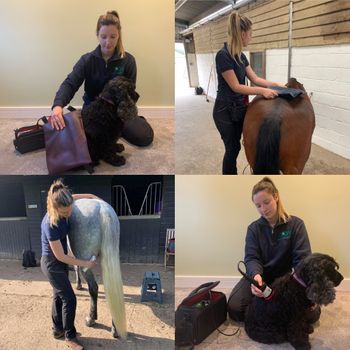
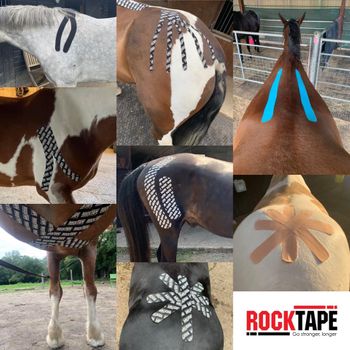
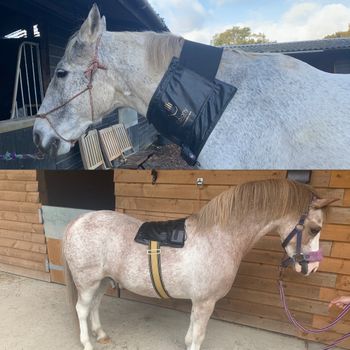

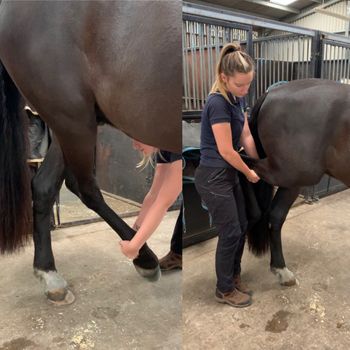
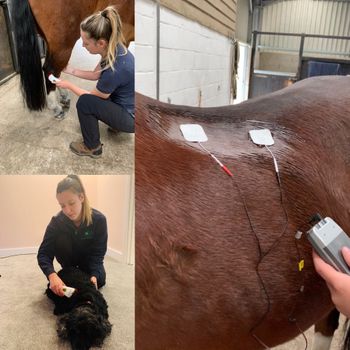
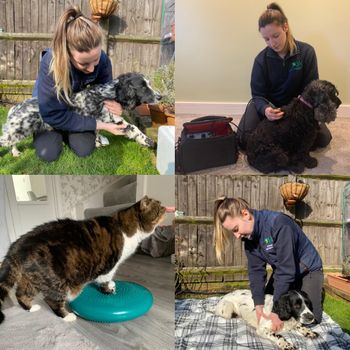
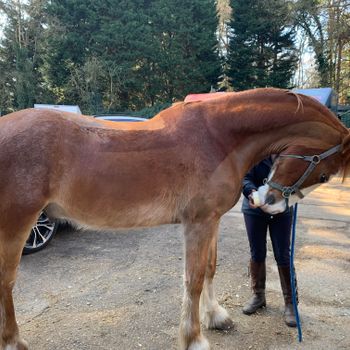
Testimonials
Very impressed with Lucy! Very thorough with her assessments and she gives really good homework exercises to help improve Ellie’s core. She also emails a detailed write up which is helpful. Ellie is a fussy ex- racehorse mare and wasn’t sure to start off with, but Lucy has been patient and worked at her pace and Ellie’s now starting to relax into her treatments. Thank you!
Laura Southgate, Hampshire
Can't recommend Lucy enough - she is very thorough in her assessment of the horses/ponies. She then tailors her therapy to each horse brilliantly - constantly watching the horse's reactions and gauging what she needs to do to assist them. She has worked on our pony 3 times and he is really improving and strengthening. So pleased to have found her!
Kate Arnold, Surrey
Cannot recommend Lucy enough. She's very thorough and has worked absolute wonders on my mare who has come on leaps and bounds in just 3 sessions. Rio absolutely loves her sessions and anyone who knows her knows that having her stand like this while her friends are all in the field is no mean feat!
Elle Yates, Surrey
Lucy is very professional with the most up to date information regarding equine physiotherapy. She is very kind and patient towards the horse as mine is definitely not easy to work with. Lucy took the time to get to know Sky better and because of this time Sky is benefiting much more now.
Jane Ewer, Surrey
Lucy was very patient with my very impatient mare.. very informative and would highly recommend. Booked further sessions as was very impressed.
Mel Day, Hampshire
Would highly recommend Lucy! She’s lovely and so attentive. It’s very clear she loves what she does and knows her stuff. She takes her time and the pampered boy absolutely loves his sessions! Thanks again Lucy!
Ellen Cook, Surrey
I cannot recommend Lucy highly enough. Lucy first started treating my horse after a kissing spine diagnosis, he is very cautious with those he does not know and Lucy’s calm and patient approach has meant she have successfully managed to treat him using all therapy methods without an adverse reaction from him (in fact on her second visit he was really starting to relax and enjoy it). My horse went for a bone scan and Lucy took the time read the report and ensure the treatment was aligned and on each visit leaves me exercises which supports his rehab based on the report. Lucy spends time with the horses she treats, the time she spends ensuring the right homework is set and explaining how to do the homework is fantastic and the support she has given me answering questions I have is exceptional. I have used many physios over the years and I can honestly say that Lucy is outstanding and she would be the first on my list of recommendations.
Samantha Turner, Surrey
I cannot recommend Lucy enough.. Brandy is a typical Welshy, can be quite inpatient and tense and try’s his luck. He hasn’t had the best year after being diagnosed with IAD last summer. Lucy has been so patient with both him and myself going through this. It’s so lovely to be able to watch her do her thing while Brandy is starting to relax and release. Thank you so much for putting the sparkly back in brandy’s eyes Lucy! You’re a star ⭐️
Jaime Mckenna, West Sussex
Contact Details
• Mobile: 07572 109117 • Email: info@lw-vetphysio.co.uk •